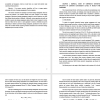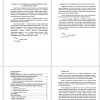Тема: CORPORATE GOVERNANCE MECHANISMS AS A TOOL FOR EARNINGS MANAGEMENT MITIGATION IN RUSSIAN PUBLIC COMPANIES
Закажите новую по вашим требованиям
Представленный материал является образцом учебного исследования, примером структуры и содержания учебного исследования по заявленной теме. Размещён исключительно в информационных и ознакомительных целях.
Workspay.ru оказывает информационные услуги по сбору, обработке и структурированию материалов в соответствии с требованиями заказчика.
Размещение материала не означает публикацию произведения впервые и не предполагает передачу исключительных авторских прав третьим лицам.
Материал не предназначен для дословной сдачи в образовательные организации и требует самостоятельной переработки с соблюдением законодательства Российской Федерации об авторском праве и принципов академической добросовестности.
Авторские права на исходные материалы принадлежат их законным правообладателям. В случае возникновения вопросов, связанных с размещённым материалом, просим направить обращение через форму обратной связи.
📋 Содержание
Аннотация 4
ABSTRACT 5
INTRODUCTION 6
CHAPTER 1.THEORETICAL ASPECTS OF CORPORATE GOVERNANCE
MECHANISMS FOR EARNINGS MANAGEMENT CONTROL 10
Earnings management as a tool for profit manipulations 10
Control mechanisms used in corporate governance 13
Impact of corporate governance control mechanisms on earnings management 17
Hypothesis development 19
CHAPTER 2.EMPRICAL STUDY OF CORPORATE GOVERNANCE INFLUENCE ON
EARNINGS MANAGEMENT LEVELS IN RUSSIAN PUBLIC COMPANIES 23
Data selection 23
Empirical models and Variables 25
Description and interpretation of results 30
Managerial implications of results 35
CONCLUSION 38
LIST OF REFERENCES 40
Appendix 1.List of sampled companies 44
Appendix 2.Correlation matrices 45
Appendix 3.Variance inflation factors 46
Appendix 4.Modified Jones model 47
📖 Введение
Earnings are different from other financial indicators as they are reported in financial statements, not by market price, meaning managers have more power to change earnings over any other performance indicators. This can lead to earnings management practices - when managers use discretion over financial report.
Earnings management can be applied for various reasons, such as before an initial public offering or competition for government subsidies, and according to Healey and Wahlen (1999) can be performed both illegally and within legal terms. However, in either case such practices can bring negative consequences for stakeholders, such as making it difficult for creditors to control companies and increasing the risk of investors making the wrong decision. Most famous case of earnings management gone terribly wrong is Enron company, which engaged in various deceptive practices to make their financial statements appear way better than they were for a prolonged period of time. The result was a great bankruptcy, causing thousands of employees to lose their jobs and investors to lose their investments.
It can be said with certainty that earnings management affects all company stakeholders. External stakeholders might have a hard time distinguishing between genuine and manipulated accounting information. Debt holders struggle to monitor and control company, as the covenants linked to reported figures fall into risk of not reflecting actual company performance. Investors and shareholders risk making incorrect investment decisions based on wrong financial data. Regulators face fiscal risks due to manipulations that have a goal of lowering company’s tax rate.
Corporate governance mechanisms can help to restrain earnings manipulations by imposing additional controls and checks. Previous studies in developed markets have found that characteristics such as presence of the audit committee, a large board of directors and managerial ownership can help to prevent earnings manipulations, but results vary across countries. In Russian context, most studies about earnings management focus on methods and ways of those manipulations, with limited number of research about the impact of corporate governance mechanisms on said manipulations in Russian companies. It is worth mentioning however that this study relies on previous findings and methods of works about impact of audit committee, board of directors and executive incentives on earnings manipulations in Russian companies, developing their discoveries and checking their validity in today’s business environment.
The research goal of the Master Thesis is to identify main characteristics of corporate governance control mechanisms established in Russian public joint stock companies and discover the correlation between each of them with earnings management for firms. To reach the research goal objectives of the Master Thesis were articulated:
1. Examine earnings management and its impact on stakeholders of the company.
2. Explain how the board of directors, audit committee and incentivizing executives can ensure the quality of financial reporting.
3. Justify a methodology for earnings management estimation.
4. Develop hypotheses and collect data for empirical research.
5. Determine the features of the board of directors influencing the level of earnings management in Russian companies.
6. Determine the characteristics of the audit committee that impact the level of earnings management in Russian companies.
7. Determinte the impact of managerial incentives on impact the level of earnings management in Russian companies.
Currently there is a number of studies available that provide various results and implications regarding corporate governance control mechanisms’ effect on levels of earnings management in the company, with conclusions varying greatly depending on geography, ownership form, market concentration and many others. However, the amount of similar studies regarding Russian market is limited, which this study seeks to replenish. What is more, a number of investors believes that corporate governance plays little to no role in Russian companies, even a joint-stock ones, so there is no need in spending time analyzing it. It is believed that management implements profit manipulations with permission and knowledge of those who should control them, and only external mechanisms like stricter legislation can make managers act fair. Not making any claims, this study also seeks to prove such statement to be right or wrong.
...
✅ Заключение
Chapter 1 of the thesis provided an overview of the concept and theory of earnings management. The chapter began by defining earnings management and discussing the reasons for its existence. Additionally, the chapter distinguished between fraudulent, illegal and legal earnings management, which is allowed by accounting standards. The different strategies of earnings manipulations were presented, as well as the potential consequences for external stakeholders. The chapter then introduced corporate governance mechanisms as a means of restraining earnings management. The responsibilities and roles of these key internal corporate governance mechanisms in controlling the quality of financial statements were described. Finally, the chapter presented the findings of previous studies conducted on different markets and developed the hypotheses for this study.
In Chapter 2, the study's sample and methodology were described, and the empirical research led to the partial acceptance of three out of five hypotheses. The first model examined the relationship between the presence of the audit committee and the extent of earnings management in Russian firms. It was found to be associated with lower levels of earnings management. However, next model found the size of the committee to be an insignificant factor, as it did not affect levels of earnings management. Next model focused on board of directors’ characteristics. The results indicated a negative association between the level of earnings management and the percentage of independent directors on the board, as well as the size of the board. The final model focused on shareholder executives’ presence in the company, finding it to be insignificant factor as well.
Three recommendations were derived from the analysis results. Firstly, investors were advised to give more attention to the corporate governance mechanisms companies adopt, as the quality of financial information has a direct impact on their wealth. To enhance the credibility of the published data, companies should employ the most well-recognized frameworks of corporate governance. Secondly, it was recommended that managers and directors responsible for corporate governance should review their governance structures, which might involve setting up an audit committee. Lastly, policymakers were advised to consider further developing the existing recommendations in the latest version of the Code of Corporate Governance.
This study added more information to the research pool of corporate governance mechanisms and earnings management for Russian companies, providing more evidence of effectiveness of certain corporate governance’ characteristics. The work explored legal earnings management, which involves manipulations within the boundaries of accounting standards. While findings of the study align with similar research performed using comparable methods (Nikulin, Sviridov, 2020), it was important to analyze data from a more recent timeframe due to the significant external changes brought by the COVID-19 pandemic, as corporate governance has become an even more critical and pertinent issue for public companies. Investors, regulators, and the general public are paying increased attention to transparency, efficiency, and accountability in corporate governance bodies, and analyzing new data provides an opportunity to assess how corporate governance mechanisms contribute to mitigating earnings management.
The study has a number of limitations. The first is the small sample size of publicly traded Russian companies, and not all of them having a functioning audit committee. A larger dataset may provide more valuable insights, but this would only be possible when corporate governance practices similar to those reviewed would become more common in Russia. The second limitation is the use of discretionary accruals as a proxy for earnings management, which does not fully capture the phenomenon of managerial manipulations with earnings. While this study used the widely used Jones model to calculate discretionary accruals, there may more accurate and better ways to measure accrual earnings management that could improve the quality of future studies in this area.
As for further research, scholars can discover how corporate governance frameworks would develop in Russia and look into changes in several years to discover how correlation has evolved. Instead of accrual-based earnings management, real earnings management correlation with corporate governance can be looked into.





